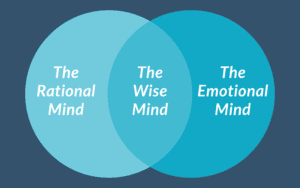How to Help Your Child Use Their Wise Mind
Written by: Shaquanta “Shelley” Shelley, M.S.

First, it is helpful to understand the mind in three parts and the advantages vs. disadvantages of these parts, then explain them to your child.
Part 1: The Rational/Reasonable Mind: This is the mind that pays attention to logic and facts. Like 2+2=4. In this state of mind, feelings don’t matter. This mind is useful for problem-solving and planning and is suitable for advancements in technology and medicine.
This mindset becomes a problem when you only focus on logic and facts ALL the time. For example, when you experience love, anger, or joy, you may try to think of the logical reasons you should feel these feelings. You will likely have judgmental thoughts towards these feelings if the logic doesn’t make sense. Having this mindset all the time will make it hard to have relationships because you won’t be able to understand other people’s emotions or understand your own emotions.
Part 2: The Emotional Mind: This is the mind that makes decisions based on urges or how you feel. Thoughts can be hard to understand because of how you feel. For example, kids may get extremely upset because they can’t get the toy they want. If they are focused on their emotions about this event, they may think something like “My parents hate me because they won’t let me get this toy.”
All emotions are good to have and experience. Problems occur when we allow emotions to control us. This can sometimes lead to depression or anxiety. We want to learn to experience our emotions and find healthy ways to express them instead of avoiding them.
Part 3: The Wise Mind: This is the rational and emotional minds together. It is inner wisdom because you consider common sense, logical thinking, emotions, and your experience. Wise Mind allows you to make the needed decision and take the best course of action. Using the Wise Mind takes practice.
Helping kids identify their emotions and problem-solving strategies will give kids the power they need to validate their experiences and take the best course of action to tackle their problems. Kids need a healthy balance of emotions and reasoning to use their wise minds. Guide kids through this process and demonstrate it so they can see how it is done!
